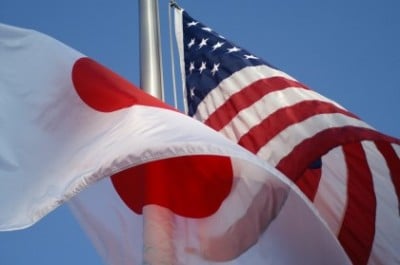
Large protests took place in Tokyo Sunday against the military legislation currently being debated in the upper house of Japan’s legislature or Diet. These demonstrations are a sign of widespread anti-war sentiment in Japan and opposition to Prime Minister Shinzo Abe’s backing of the US war drive against China.
Tens of thousands of people took part in the Tokyo protest outside the Diet building, with organizers estimating the crowd at 120,000. Smaller rallies took place at around 200 locations throughout Japan. In Osaka, 25,000 people gathered to denounce the legislation and the Abe government.
Various groups organized the demonstrations. Some have ties to opposition parties, such as the Democratic Party of Japan (DPJ). The protesters carried signs and chanted slogans, including “Peace not war,” “Scrap the bills now” and “Abe Quit!”
The legislation is comprised of two bills. One would allow the government to dispatch the Self-Defense Forces (SDF) without seeking the enactment of a special law or regular extensions in the Diet. The other bill consists of 10 revisions to current laws that would permit Japan to provide military support for an ally, namely the United States.
The legislation would allow Japan to join US-led wars, notably against China. The US has encouraged Tokyo to remilitarize as part of its “pivot to Asia”—a comprehensive strategy aimed at undermining Chinese influence throughout the region and militarily encircling China. The Abe government is using the opportunity to cast off post-World War II restrictions on its armed forces in order to aggressively pursue the interests of Japanese imperialism.
DPJ leader Katsuya Okada and Japanese Communist Party (JCP) head Kazuo Shii spoke at yesterday’s protest, posturing as opponents of Abe’s militarist agenda. “The Abe administration must understand that ordinary citizens have a sense of crisis and are angry,” Okada stated. Shii declared: “We will definitely bring the bills to an end by expanding the campaign against them across Japan.”
However, the entire political establishment has lined up in one way or another with the aggressive stance taken by the US and its allies against China. While in power in 2012, the DPJ “nationalized” the disputed Senkaku/Diaoyu Islands in the East China Sea, provocatively antagonizing Beijing. At the time, the JCP criticized the DPJ for not more aggressively asserting Japan’s claims to the islands and blamed China for creating regional tensions.
The anti-war protests have steadily grown in size in recent months since the military legislation passed in the lower house in May, and are attracting a broad cross-section of people. Elderly Japanese who still recall the horrors of World War II have joined the protests, along with young people and students who typically have been marginalized from politics in Japan.
In the Japan Times, Michio Yamada, 75, recounted the experience of the devastating US fire-bombing of Tokyo in 1945. “With the advance of technologies (over the past seven decades), war is likely to be more deadly than it used to be,” he said. “In this age of nuclear weapons, you will never know how massive a death toll is going to be. The danger is far bigger than before. We should never let it happen again.”
Many participants said their opposition to war had involved them in protests for the first time. “I think there are a growing number of people like me who realized things have only turned worse under Abe’s government,” Etsuko Matsuda, 40, told the Associated Press. “I hope more people will be interested in politics and speak up.”
New protest organizations have emerged, including Mothers Against War, which started in July and has collected 20,000 signatures of people opposed to Abe’s military legislation. A 14-year-old junior high school student who protested alongside her mother stated: “I am not eligible to vote, but I don’t want to see the legislation passed because I want peace to continue in Japan.”
Another group, the Committee of Anti-War 1000, has gathered 1,650,000 signatures in opposition to the security legislation. Also prominent in the protests is Students Emergency Action for Liberal Democracy, or SEALD, which was formed in response to the state secrecy law passed in December 2013.
A number of lawyers have criticized the military legislation as unconstitutional as it contravenes Article Nine of the country’s constitution which formally renounces war forever and declares that Japan will never maintain land, air and sea forces.
Abe chose to “reinterpret” the constitution last year, knowing full well that an amendment, which requires the passage of a national referendum, would almost certainly be defeated. Recent polls indicated that around 60 percent of respondents were outright opposed to the security legislation while upward of 80 percent expressed concerns.
The widespread hostility to the new security laws reflects the deep-rooted anti-war sentiment in Japan, particularly in the working class. In 1960, sustained mass protests erupted against the signing of a revised US-Japan Security Treaty, which allowed for the continued presence of US military bases in Japan indefinitely and committed Japan as a US military ally. The protests forced the cancellation of a planned visit to Japan by US President Eisenhower. At their height, the US military sent a helicopter to rescue the US ambassador, whose car was surrounded by protesters.
While the treaty was finally ratified, Japanese Prime Minister Nobusuke Kishi felt compelled to resign. Following World War II, Kishi was initially held on suspicion of war crimes. He was an official of the Japanese puppet regime in Manchuria and a minister in the wartime cabinet of Prime Minister Hideki Tojo. Abe, who is Kishi’s grandson on the maternal side, has repeatedly declared his admiration for Kishi.
Source Article from http://www.globalresearch.ca/mass-protests-in-japan-oppose-collective-self-defence-laws/5472954
Related posts:
Views: 0
 RSS Feed
RSS Feed

















 August 31st, 2015
August 31st, 2015  Awake Goy
Awake Goy 
 Posted in
Posted in  Tags:
Tags: 
















